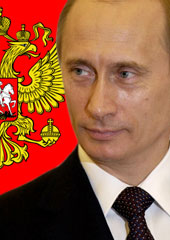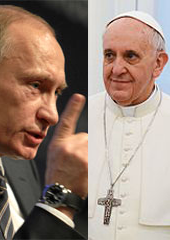Why Putin Plays a Losing Hand on Ukraine
Thinking straight about Ukraine – in six theses
March 3, 2014

1. Stay calm and carry on
Russia has de facto taken over part of a neighboring country. Such Russian behavior is not really new. It happened before in the Abkhazia and South Ossetia regions of Georgia (1993 and 2008) as well as in the Transnistria region of Moldova (1992).
But compared to the earlier mini-conflicts, the case of Crimea and Ukraine is much bigger. The conflict is much more part of a general confrontation between an increasingly authoritarian Russia and the West.
The best guess remains that the Crimean conflict is unlikely to turn into a protracted major war (fingers crossed). No local force could be a match for Russia, which has de facto taken control of most of Crimea.
2. Another Cold War? Remember who lost the last one?
Crimea could herald a mild version of a cold war between Russia and the West. If so, what is the long-term outlook? The answer becomes self-evident if you remember who lost the last cold war.
Because Russia and Ukraine are quite backward economically, Crimea is probably not a serious long-term economic event for Europe and the world. Exports to Russia amount to 1% of EU and 1.4% of German GDP, exports to Ukraine to 0.2% of EU and German GDP.
True, Ukraine is a major transit country for Russian energy to Europe. And potential supply disruptions could, of course, have some impact on European energy prices and hence real incomes for a while.
But given that Russia is heavily dependent on the revenue, Moscow will likely keep such disruptions to a minimum under almost all circumstances.
3. Small impact on financial markets and geopolitics
The Crimean conflict will likely trigger a near-term correction in markets and some jitters in sentiment indicators. But I do not expect it to be bad enough to change underlying fundamental trends in a serious way.
Of course, the Russian takeover of Crimea does heighten geopolitical risks. Russia’s blatant breach of international trust and treaties, of which Germany’s Chancellor Angela Merkel reminded her Russian counterpart in no uncertain terms, makes it more difficult for the West to work with Russia.
This will have effects on the Iranian and Syrian question. As a result, we see some extra emerging market risk for this year, but not a major lasting upset for Western markets beyond some initial noticeable jitters.
At the margin, the conflict close to its Eastern fringe could further enhance the cohesion of the Eurozone.
4. Russia as the ultimate loser of the Ukraine power play
The biggest risk and clearest negative fallout, however, is ultimately to Russia itself.
- An anti-Russian counterreaction will likely make it very difficult for Russia to regain any influence in Kyiv and anywhere west of there.
- Europe (and Turkey) will likely strengthen their efforts to become less dependent on Russian energy. This will weaken Russia’s potential to blackmail its neighbors in the wider region in the future.
- Limited targeted Western sanctions, or a mere reluctance to deal with Russia, can further hurt Russia’s business interests.
Russia has an inefficient economy dependent on rising prices for oil and gas. Sochi was already expensive. Military adventures and strained relations with the West can be much more expensive than that. Russia cannot afford that in the long run.
Expect Putin to face serious discontent at home after an initial period of domestic support for his chauvinistic policies.
5. What the EU should do
The conflict gives Europe and the United States a strong extra reason to stabilize Ukraine. If they manage to do so (a big if), a future contrast would emerge between Ukraine on the one hand and Russia and any Russian-occupied parts of Ukraine on the other hand.
Ukraine would gradually become part of the European mainstream. Russia and any Russian-occupied parts of Ukraine ruled by an increasingly autocratic Putin would likely turn into an ever-more isolated and backward region.
That contrast could eventually tilt the balance of public opinion on Crimea and other parts of South-Eastern Ukraine back towards Kyiv — and away from Moscow over time.
The EU is unlikely to offer Ukraine full membership yet. But far-reaching association agreements including free travel could be a major benefit for Ukrainians and their new government.
6. Conclusion
The ultimate losers will likely be Putin and his version of Russia.
Takeaways
The ultimate loser of his little #Crimea adventure will likely be Putin himself -- and his version of Russia.
Crimea could herald a mild version of another cold war. Just remember who lost the last cold war.
Europe (and Turkey) will likely strengthen their efforts to become less dependent on Russian energy.
Sochi was already expensive. Military adventures and strains with the West are much more expensive than that.
Expect Putin to face serious discontent at home after an initial domestic support for his chauvinistic policies.

